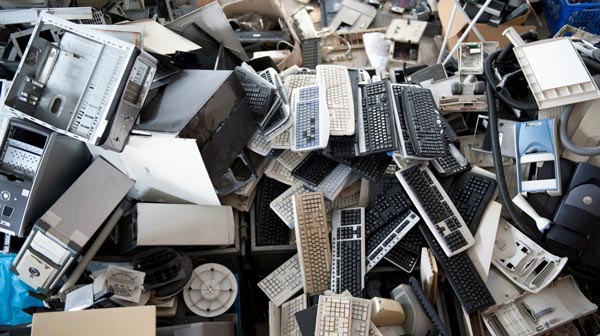R2 Certification: The Mark of Quality in Electronics Recycling
R2 Certification: The Mark of Quality in Electronics Recycling
Blog Article
Elevate Your E-Waste Monitoring With R2 Accreditation: an Extensive Summary
One key technique to boost e-waste monitoring methods is by achieving R2 qualification. By discovering the procedures and benefits associated with R2 qualification, a much deeper understanding of how it can transform e-waste administration strategies emerges, shedding light on a course in the direction of sustainability and ethical disposal practices.
Significance of E-Waste Monitoring

When e-waste is not managed appropriately, these toxic substances can permeate into the ecosystem, triggering damage to wildlife and possibly entering the food web, positioning dangers to human health. In addition, the inappropriate disposal of e-waste contributes to pollution and greenhouse gas emissions, worsening environment change and ecological deterioration.

Advantages of R2 Certification

First of all, R2 accreditation boosts trustworthiness by showcasing a company's devotion to sustainable methods. It assures consumers, partners, and stakeholders that the business sticks to rigid requirements for e-waste administration - r2 certification. This trustworthiness can bring about boosted trust and improved partnerships with customers that prioritize ecological responsibility
Secondly, R2 accreditation helps mitigate threats associated with improper e-waste disposal. By complying with the stringent standards established forth by the qualification, companies can reduce the chance of information breaches, ecological contamination, and legal effects. This aggressive method safeguards the business's track record and decreases potential obligations.
Lastly, R2 accreditation shows a dedication to ecological stewardship - r2 certification. By responsibly managing electronic waste via certified procedures, companies add to the conservation of sources, reduction of pollution, and promo of a circular economy. This commitment not just benefits the setting however additionally straightens with advancing customer assumptions for lasting service practices
R2 Accreditation Refine Summary
Having actually established the advantages of R2 certification in advertising integrity, threat mitigation, and environmental stewardship, it is important to currently lay out the comprehensive procedure included in obtaining this qualification. The R2 accreditation process begins with a comprehensive review of the organization's operational policies and treatments to guarantee compliance with the R2 standard. This initial analysis is essential in recognizing any kind of voids that require to be resolved before proceeding better.
As soon as the company's techniques line up with the R2 typical needs, an independent third-party auditor performs an on-site audit to review the application and performance of these methods. This audit go to this website includes a detailed review of documents, meetings with staff, and physical evaluations of centers to confirm conformity.
Complying with an effective audit, the organization receives an accreditation decision based upon the auditor's searchings for. If accepted, the company is provided R2 qualification, demonstrating its dedication to responsible e-waste administration. It is crucial to note that maintaining R2 accreditation calls for ongoing conformity with the standard's requirements and regular audits to make certain continued adherence to finest techniques in e-waste recycling and disposal.
Key Requirements for R2 Compliance
A necessary element of attaining R2 conformity is ensuring that all electronic waste (e-waste) processing facilities meet rigid environmental and safety and security standards. To follow R2 demands, organizations need to why not try these out abide by vital criteria that focus on accountable e-waste monitoring methods. These requirements include executing a documented ecological, wellness, and security monitoring system, making certain the secure handling of data-containing gadgets, and conducting comprehensive downstream due diligence to track the final destination of e-waste products.
Moreover, R2 conformity requires the correct testing, refurbishment, and recycling of electronic devices to expand its helpful life and lessen ecological effect. Facilities looking for R2 qualification need to likewise focus on employee health and wellness by supplying required training, personal safety equipment, and a secure working atmosphere. Furthermore, maintaining comprehensive documents of e-waste processing activities and regularly undertaking audits by recognized certifying bodies are crucial components of demonstrating ongoing conformity with R2 standards.
Impacts of Lasting E-Waste Practices
The execution of sustainable e-waste techniques based on R2 conformity not only ensures environmental and safety requirements are met however likewise considerably influences the overall lifecycle of digital products. By adhering to R2 standards, electronic waste administration processes end up being much more efficient, decreasing the environmental impact of electronic items. Lasting e-waste practices assist in the appropriate disposal of electronic components, ensuring that dangerous products are handled sensibly and do not end up contaminating the setting.
In addition, lasting e-waste practices can contribute to task development in the recycling and refurbishment markets, promoting economic growth while advertising ecological obligation. Overall, the fostering of sustainable e-waste methods under R2 qualification serves as an important action towards accomplishing an extra ecologically lasting electronics sector.
Final Thought
In conclusion, implementing correct e-waste monitoring techniques is vital for environmental sustainability and resource preservation. R2 qualification plays an essential duty in ensuring accountable handling and disposal of electronic waste. By adhering to the rigid requirements stated by R2 criteria, organizations can not only lessen their ecological effect however additionally add to a much more sustainable future for generations to come.
One trick technique to elevate e-waste monitoring techniques is by obtaining R2 certification. By discovering the advantages and processes associated with R2 qualification, a deeper understanding of how it can reinvent e-waste administration approaches arises, losing light on a course towards sustainability and moral disposal methods.
The R2 qualification process starts with a detailed evaluation of the organization's functional plans and procedures to guarantee view it compliance with the R2 criterion. If accepted, the company is granted R2 certification, demonstrating its dedication to responsible e-waste monitoring. On the whole, the fostering of sustainable e-waste methods under R2 accreditation serves as a critical step in the direction of accomplishing an extra environmentally sustainable electronic devices market.
Report this page